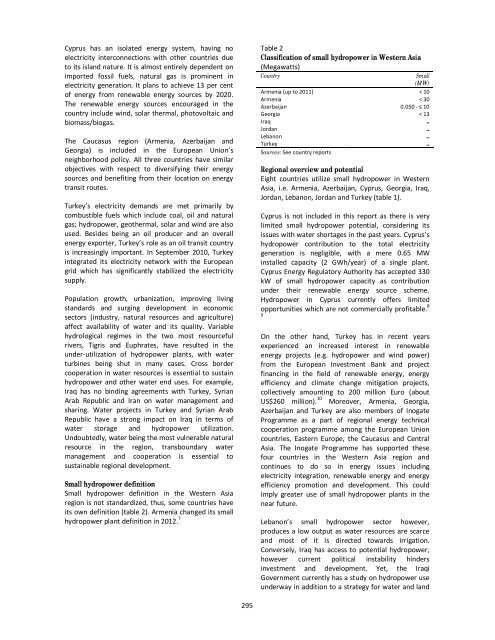WSHPDR_2013_Final_Report-updated_version
WSHPDR_2013_Final_Report-updated_version
WSHPDR_2013_Final_Report-updated_version
Create successful ePaper yourself
Turn your PDF publications into a flip-book with our unique Google optimized e-Paper software.
Cyprus has an isolated energy system, having no Table 2<br />
electricity interconnections with other countries due<br />
to its island nature. It is almost entirely dependent on<br />
imported fossil fuels, natural gas is prominent in<br />
electricity generation. It plans to achieve 13 per cent<br />
of energy from renewable energy sources by 2020.<br />
The renewable energy sources encouraged in the<br />
country include wind, solar thermal, photovoltaic and<br />
biomass/biogas.<br />
The Caucasus region (Armenia, Azerbaijan and<br />
Georgia) is included in the European Union’s<br />
neighborhood policy. All three countries have similar<br />
objectives with respect to diversifying their energy<br />
sources and benefiting from their location on energy<br />
transit routes.<br />
Turkey’s electricity demands are met primarily by<br />
combustible fuels which include coal, oil and natural<br />
gas; hydropower, geothermal, solar and wind are also<br />
used. Besides being an oil producer and an overall<br />
energy exporter, Turkey’s role as an oil transit country<br />
is increasingly important. In September 2010, Turkey<br />
integrated its electricity network with the European<br />
grid which has significantly stabilized the electricity<br />
supply.<br />
Population growth, urbanization, improving living<br />
standards and surging development in economic<br />
sectors (industry, natural resources and agriculture)<br />
affect availability of water and its quality. Variable<br />
hydrological regimes in the two most resourceful<br />
rivers, Tigris and Euphrates, have resulted in the<br />
under-utilization of hydropower plants, with water<br />
turbines being shut in many cases. Cross border<br />
cooperation in water resources is essential to sustain<br />
hydropower and other water end uses. For example,<br />
Iraq has no binding agreements with Turkey, Syrian<br />
Arab Republic and Iran on water management and<br />
sharing. Water projects in Turkey and Syrian Arab<br />
Republic have a strong impact on Iraq in terms of<br />
water storage and hydropower utilization.<br />
Undoubtedly, water being the most vulnerable natural<br />
resource in the region, transboundary water<br />
management and cooperation is essential to<br />
sustainable regional development.<br />
Small hydropower definition<br />
Small hydropower definition in the Western Asia<br />
region is not standardized, thus, some countries have<br />
its own definition (table 2). Armenia changed its small<br />
hydropower plant definition in 2012. 7<br />
295<br />
Classification of small hydropower in Western Asia<br />
(Megawatts)<br />
Country<br />
Small<br />
(MW)<br />
Armenia (up to 2011) < 10<br />
Armenia < 30<br />
Azerbaijan 0.050 - ≤ 10<br />
Georgia < 13<br />
Iraq ..<br />
Jordan ..<br />
Lebanon ..<br />
Turkey ..<br />
Sources: See country reports<br />
Regional overview and potential<br />
Eight countries utilize small hydropower in Western<br />
Asia, i.e. Armenia, Azerbaijan, Cyprus, Georgia, Iraq,<br />
Jordan, Lebanon, Jordan and Turkey (table 1).<br />
Cyprus is not included in this report as there is very<br />
limited small hydropower potential, considering its<br />
issues with water shortages in the past years. Cyprus’s<br />
hydropower contribution to the total electricity<br />
generation is negligible, with a mere 0.65 MW<br />
installed capacity (2 GWh/year) of a single plant.<br />
Cyprus Energy Regulatory Authority has accepted 330<br />
kW of small hydropower capacity as contribution<br />
under their renewable energy source scheme.<br />
Hydropower in Cyprus currently offers limited<br />
opportunities which are not commercially profitable. 8<br />
9<br />
On the other hand, Turkey has in recent years<br />
experienced an increased interest in renewable<br />
energy projects (e.g. hydropower and wind power)<br />
from the European Investment Bank and project<br />
financing in the field of renewable energy, energy<br />
efficiency and climate change mitigation projects,<br />
collectively amounting to 200 million Euro (about<br />
US$260 million). 10 Moreover, Armenia, Georgia,<br />
Azerbaijan and Turkey are also members of Inogate<br />
Programme as a part of regional energy technical<br />
cooperation programme among the European Union<br />
countries, Eastern Europe, the Caucasus and Central<br />
Asia. The Inogate Programme has supported these<br />
four countries in the Western Asia region and<br />
continues to do so in energy issues including<br />
electricity integration, renewable energy and energy<br />
efficiency promotion and development. This could<br />
imply greater use of small hydropower plants in the<br />
near future.<br />
Lebanon’s small hydropower sector however,<br />
produces a low output as water resources are scarce<br />
and most of it is directed towards irrigation.<br />
Conversely, Iraq has access to potential hydropower,<br />
however current political instability hinders<br />
investment and development. Yet, the Iraqi<br />
Government currently has a study on hydropower use<br />
underway in addition to a strategy for water and land


